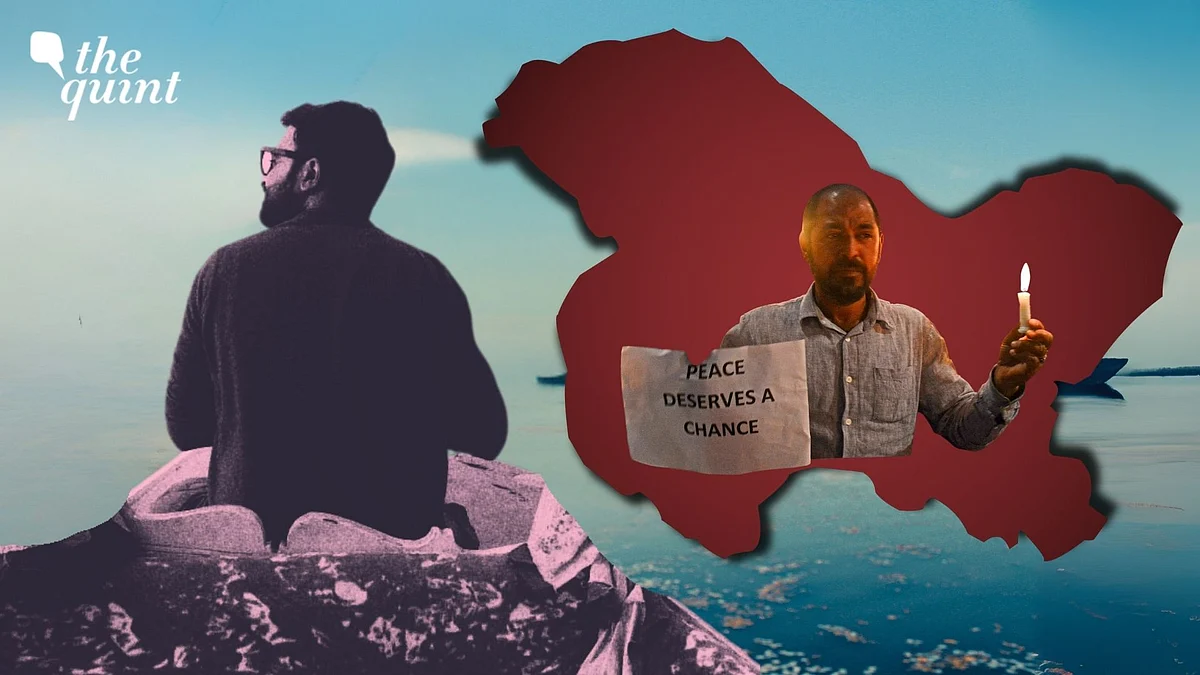'Even 820 Km Away From My Home in Kashmir, I Carry the Weight of War Anxiety'
The day I heard of the attack, my first instinct was to call my mother back home in Kashmir, writes Athar Rather.

advertisement
As I write this, almost two weeks have passed since the Pahalgam attack. I’m in Delhi—nearly 820 kilometres away from my hometown in Kashmir—yet the heaviness of it lingers, unbearably close.
Violence is not new to us. We’ve grown up surrounded by it—attacks, killings, bullets. But the targeting of innocent tourists this time felt like a deeper betrayal. Even in conflict, there are certain unspoken boundaries. This time, that line was crossed. The attack was brutal, it was heinous, and above all, it was unimaginable—for me, as a Kashmiri. It is an act that must be condemned without hesitation. My heart aches for the victims, and my deepest condolences go to their families.
Baramulla, our hometown, is a good distance from Pahalgam, but in Kashmir, even the smallest pebble can stir turbulent waves. Our phone call, as always, was brief and guarded. "Do not discuss anything over the phone," she often reminds me during our in-person meetings.
So, we stick to the basics. I carry my thoughts, fears, and emotions with me, waiting for a time and place where they can be shared freely, if at all.
'The Cost of Decades Of Conflict'
I lost my father in March 2019, just days after the Balakot air strike. On 28 February, he suffered a massive stroke. That week, the sky above Kashmir thundered with fighter jets.
"The sound was deafening," my mother recalls. She told me, days after he passed, that he would sit and follow the news of the escalating tension, scrolling endlessly through updates on his phone. "He wanted you to come home… what if there was a war and you got stuck in Delhi?" she told me, breaking down.
I never got to hear what he wanted to say. That moment is sealed in time: unanswered, unfinished. I often think it wasn’t the stroke that took him. It was the anxiety, the fear, the noise of war drums on prime-time television. But that kind of grief doesn’t appear on death certificates.
A few days ago, I came across a news debate where a TV anchor passionately compared India and Pakistan’s arsenals. It felt like a trailer for an inevitable war—if you believed him. There were graphics of missiles, tanks and Tejas jets slicing through the sky, in ultra-high definition. "Pakistan loses in every scenario," he kept repeating, as though it were a sport, a game.
'I Grew Up in the Shadow of Conflict'
My earliest memories are of crackdowns—soldiers knocking on our doors, my father lining up outside with other men in the neighbourhood, while we peeked through the curtains in silence.
As a child, fear became familiar: the sound of boots, the curfew sirens, the distant but sharp echo of gunfire, and the evening news filled with reports of encounters and blasts. Newspapers often carried bloodied images of those killed the day before, or that same morning.
Kashmir mourns every innocent life lost as its own. But outside Kashmir, the story feels different—often cruelly detached. A minority within a minority. A Kashmiri Muslim identity in India is frequently viewed with suspicion. On a regular day, this suspicion simmers quietly in stares and silence. But, in the aftermath of such a tragedy, it erupts into open hatred.
Some of the tourists who were saved by local Kashmiris spoke openly about the humanity and compassion they experienced. They glimpsed the Insaniyat Kashmir has long stood for. They heard the Valley’s pain—perhaps for the first time.
But their words, like ours, seem to get lost somewhere before they reach Delhi. Maybe the distance of 800 kilometres is too much. Or maybe there are simply too few willing to listen.
By now, many Kashmiri students have returned home in fear. Shawl sellers have packed up their lives and fled, beaten and humiliated. And in television studios, anchors continue to beat the drums of war with impunity.
'We Want Peace and a Life Without Fear'
Kashmiris, like anyone else, want peace, dignity, and a life without fear. We are doctors, artists, teachers, and students—not a monolith, not a threat.
The burden of maintaining peace does not lie with the ordinary Kashmiri simply trying to survive another day—it lies with those in power, with governments and institutions.
When blame is placed on the victims of violence instead of those responsible for preventing it, the cycle deepens.
Hatred isolates. Empathy heals.
Our stories may never make it to national headlines or prime-time debates with animated graphics. But they are our truths. They are personal. And they matter.